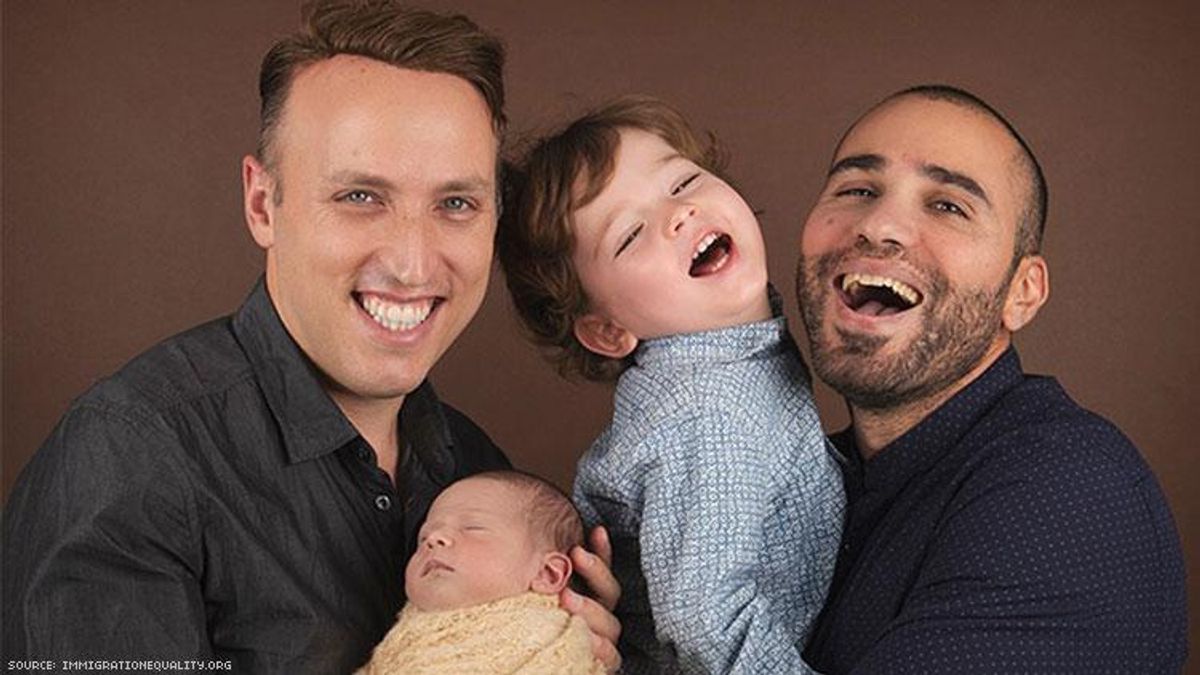The State Department is conceding defeat in two cases involving its refusal to recognize U.S. citizenship of children born abroad to married same-sex couples who are also American citizens.
The department Monday withdrew its appeal in one case, Kiviti v. Pompeo, and decided not to appeal a U.S. district court's decision in another, Mize-Gregg v. Pompeo, according to a press release from Lambda Legal. The defendant named in both is Secretary of State Mike Pompeo.
The State Department had considered the children born "out of wedlock" because they did not have a biological relationship to one of the parents, and therefore denied that they were citizens at birth. In almost all cases involving married opposite-sex couples, the department has not required children to have a biological relationship to both parents in order to be recognized as citizens.
The couple in Kiviti v. Pompeo, Roee and Adiel Kiviti of Chevy Chase, Md., have a son, Lev, born via surrogacy in Canada in 2016, and a daughter, Kessem, born in 2019, also in Canada via surrogacy. When they applied for a passport for Lev in January 2017, his citizenship was recognized and the passport granted, but that was not the case with Kessem. The State Department told them she did not qualify for U.S. citizenship because she has a biological relationship only to Adiel, who had lived in the U.S. for less than five years. Both Roee and Adiel were born in Israel and are naturalized U.S. citizens, and they married in California in 2013.
They sued, represented by Lambda Legal, Immigration Equality, and the law firm Morgan, Lewis, and Bockius. In June of this year, the U.S. District Court for the District of Maryland held that for the children of married parents, the law required no biological connection to a parent in order for the child to be born a citizen. The court also expressed concern that treating the marital children of same-sex couples as if they were born out of wedlock raised serious constitutional issues. The State Department appealed but has now withdrawn it.
In a similar case, the State Department decided not to appeal Mize-Gregg v. Pompeo, so an August ruling from of the U.S. District Court for the Northern District of Georgia will also stand. In this case, Simone Mize-Gregg, daughter of Derek and Jonathan Mize-Gregg, was declared to be a U.S. citizen from birth after the court found the U.S. Department of State's policy raised serious constitutional questions.
Both couples expressed relief. "We are very relieved, on behalf of our daughter, on behalf of our family, and on behalf of LGBT families across this great country of ours," Roee Kiviti said in the press release. "The law was always clear. We knew it, the courts knew it, and now the State Department knows it too." Adiel Kiviti added, "This was never just about us. It was always about standing up for what's right. We are grateful to those who did it before us, and we are humbled to be a part of the ongoing struggle for justice."
"We are extremely grateful that this fight is over and won," said Derek Mize and Jonathan Gregg. "All we ever wanted was for Simone to be treated fairly. This process has reaffirmed for us that standing up for equal treatment is always right, no matter how difficult it is or long it may take."
"Every court to have looked at this issue has concluded that the Department of State cannot refuse to recognize the U.S. citizenship of children born abroad to married same-sex couples. We are gratified that the victories of the Kiviti and Mize-Gregg families are now final and we hope that the Trump administration and the State Department will abide by these courts' decisions when it encounters other families headed by same-sex couples," said Omar Gonzalez-Pagan, senior attorney at Lambda Legal and one of the lawyers for the families. "No family should have to go through what the Kiviti and Mize-Gregg families endured."
Immigration Equality is representing couples in two other cases regarding the issue. This month the U.S. Court of Appeals for the Ninth Circuit upheld a lower court's ruling that the son of binational couple Andrew and Elad Dvash-Banks is entitled to birthright citizenship.
Andrew and Elad, a U.S. citizen and an Israeli citizen respectively, have twin sons, one conceived with Andrew's sperm and one with Elad's, using eggs from the same donor, who then carried both children and gave birth to them moments apart in Canada. The State Department had ruled that Aiden, the child conceived with Andrew's sperm, is a U.S. citizen, but his brother, Ethan, conceived with Elad's sperm, is not. Both the trial court and the appeals court found the State Department's policy discriminatory and that Ethan was entitled to citizenship just as his brother was.
It's not yet known if the State Department will appeal this ruling, Immigration Equality Executive Director Aaron Morris told The Advocate, but he remains hopeful the department won't go that far. The next step would be the U.S. Supreme Court. The other case, involving Allison Blixt and Stefalia Zaccari -- a U.S. citizen and an Italian citizen, respectively -- and their two sons, is still pending at the trial court level.


















































































Fans thirsting over Chris Colfer's sexy new muscles for Coachella